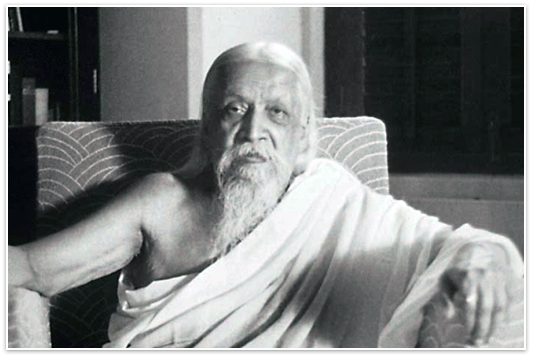THE IDEAL OF FORGIVENESS
(A short story by Sri Aurobindo)
Everyday we witness the vicious cycle of Revenge and Violence around us. There are many reasons and justifications given for the merits of taking revenge; by one human being against another human being, one powerful country against another weak country, one political party against the another political party, one community against the another community, one religion against another religion etc, etc, etc. Our day-to-day lives are filled with the thoughts and scenes of violence. We see violence if we switch on our television, read newspapers or go to the street. Sri Aurobindo, the modern Rishi and ‘Harbinger of Supramental Consciousness’, teaches us on the Ideal of Forgiveness through this exemplary short story, weaved with two metaphoric characters of ‘Vashistha’ and ‘Visvamithra’ the popular ancient Vedic rishis of Indian lore.

The moon was drifting slowly through the clouds. Far below, the river danced along in its course mingling its murmur with the winds. Wondrously beautiful was the earth in the half moon-light, half-darkness. All around were forest retreats of Rishis, each of which put to shame the divine Nandan garden. Every hermitage with its trees, flowers and creepers took on a marvellous beauty. On such a moon~enraptured night Brahmarshi Vashishtha said to his wife Arundhati Devi, “Devi, please go and ask for some salt from Rishi Vishwamitra.” Amazed at this request Arundhati Devi asked, “What is it you are commanding me to do? I am at a loss to understand. He who has robbed me of a hundred sons…..” Even as she said those words, her voice choked with sobs, memories of the past revived in her heart, the abode of wonderful peace was pained to its depths. She continued, “My hundred Sons used to chant the Veda on such moon-lit nights, all of them learned in the Veda and devoted to Brahman; he has destroyed those hundred sons of mine; you are asking me to beg salt from his Ashram? I am bewildered as to my duty.”
Slowly the Rishi’s face was filled with celestial light. From the depths of his ocean-like heart came these words, “Devi, I love him.” Arundhati’s amazement increased. “If you love him,” said she, “you might as well have addressed him as Brahmarshi and I would not have been deprived of my hundred sons.” The Rishi’s face took on a singular beauty. “I did not call him a Brahmarishi just because I love him,” said he, “it is because I have not done so that there is still hope of his becoming a Brahmarshi.” Vishwamitra was beside himself with rage that day. He could not concentrate on his tapasya. He resolved that if Vashishtha did not acknowledge him as a Brahmarishi that day, he would take Vashishtha’s life. To carry out his resolve he left his cottage, armed with a sword. Slowly he came by the side of Vashishtha’s cottage and stood there. He heard all that Vashishthadeva said. His grip on the sword loosened, he thought, “Alas! What have I done? What wrong have I committed unwittingly? Whose un perturbed heart have I tried to hurt?” He felt the sting of a hundred Scorpions in his heart and it burnt with repentance. He rushed in and fell at Vashishtha’s feet. He could not speak for sometime but after a while said, “Kindly pardon me. But I am not fit even to ask for pardon.” So proud was his heart, he could not say any more. But what did Vashishtha do? He stretched forth his two arms and embracing Vishwamitra said, “Rise, Brahmarishi, rise.” Doubly embarrassed, Vishwamitra said, “Why do you deride me, my lord?” “I never tell a lie,” replied Vashishtha, “today you have become a Brahmarishi; you have shed your pride, today you have attained the status of Brahmarishi.” “Teach me the science of Brahman,” implored Vishwamitra. “Go to Anantadeva,” Vashishtha answered, “he will instruct you in the divine lore.”
Vishwamitra went where Anantadeva stood supporting the Earth on his head. He said to Vishwamitra, “I can teach you the science of Brahman if you are able to hold the Earth on your head.” Still proud of his powers by austerities, Vishwamitra exclaimed, “Let go the Earth, I shall take it on my head.” “Hold it then, I am letting it go.” The Earth began to spin down and further down in space.”I offer the entire fruit of my tapasya,” cried out Vishwamitra, “let the Earth be steady.” Yet the Earth did not become still. Anantadeva said aloud, “Vishwamitra you have not yet done enough tapasya to support the Earth. Have you ever been in holy company? Offer the fruit of that.” “I was with Vashishtha for a moment,” said Vishwamitra. “Then offer up the merit of that,” said Anantadeva. “I surrender that fruit,” replied Vishwamitra. Slowly the Earth grew still. “Instruct me in the divine lore now,” said Vishwamitra. “You fool,” exclaimed Anantadeva, “you ask me for the knowledge of Brahman instead of the one as a result of whose momentary company the Earth stood still?” Vishwamitra was seized with anger; he thought Vashishtha had deceived him. He hurried back to Vashishtha and asked, “Why have you misled me?” Unruffled, Vashishtha solemnly answered, “If I had instructed you in Brahman-knowledge then, you would not have had any faith in me. Now you will have it.” Vishwamitra learnt the science of Brahman from Vashishtha.
Such seers and saints once lived in India. Such was their ideal of forgiveness. Such power one could gain by askesis as would hold the Earth in space. Rishis are taking birth in India whose lustre will dim the radiance of the seers of the past, who will bring to India a glory greater than she has ever known before.
Courtesy& Copyright: Sri Aurobindo’s “The Chariot of Jagannatha,” published by Sri Aurobindo Ashram Trust.
